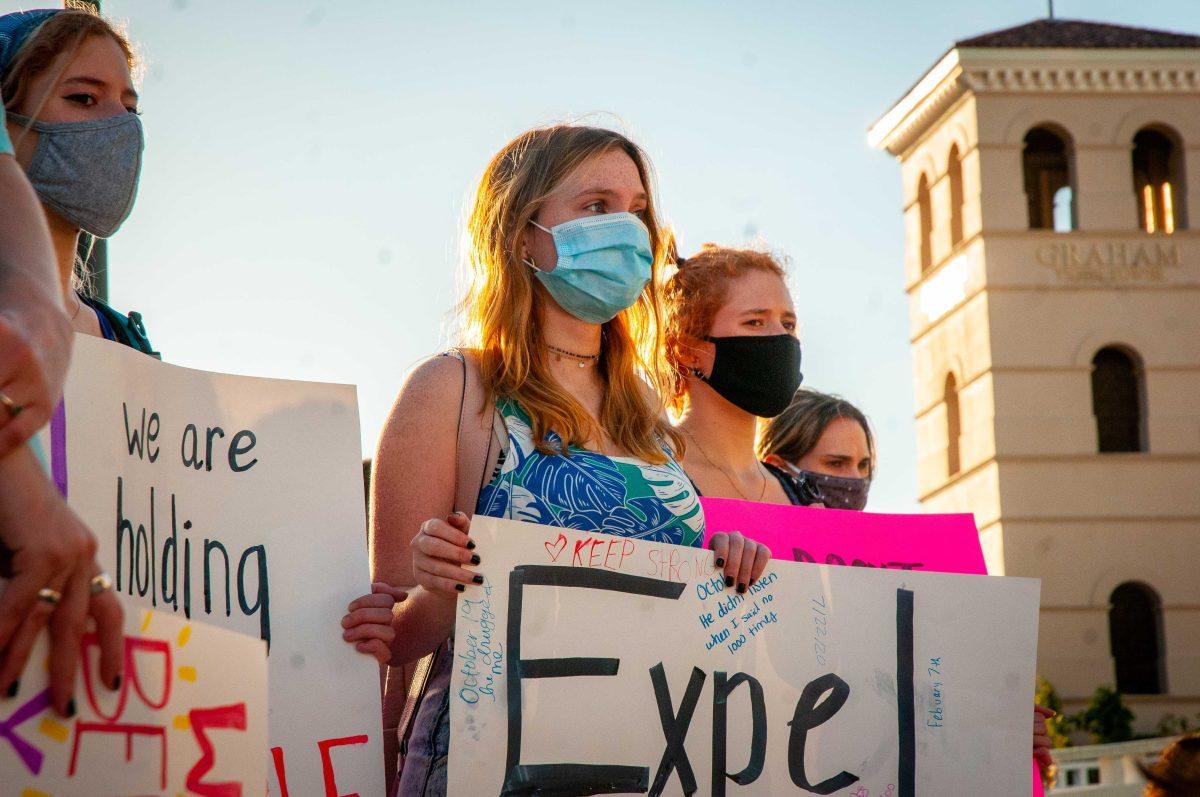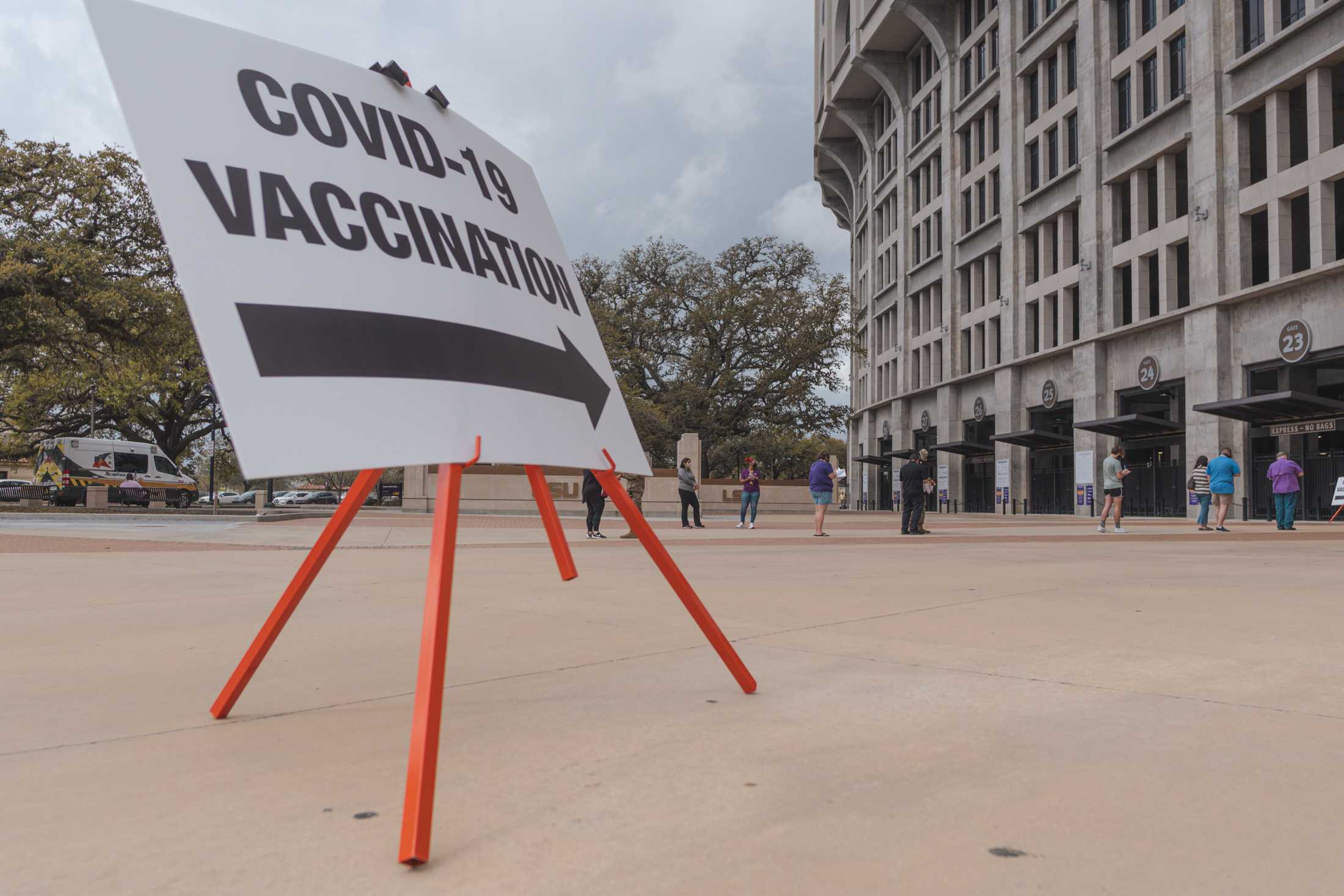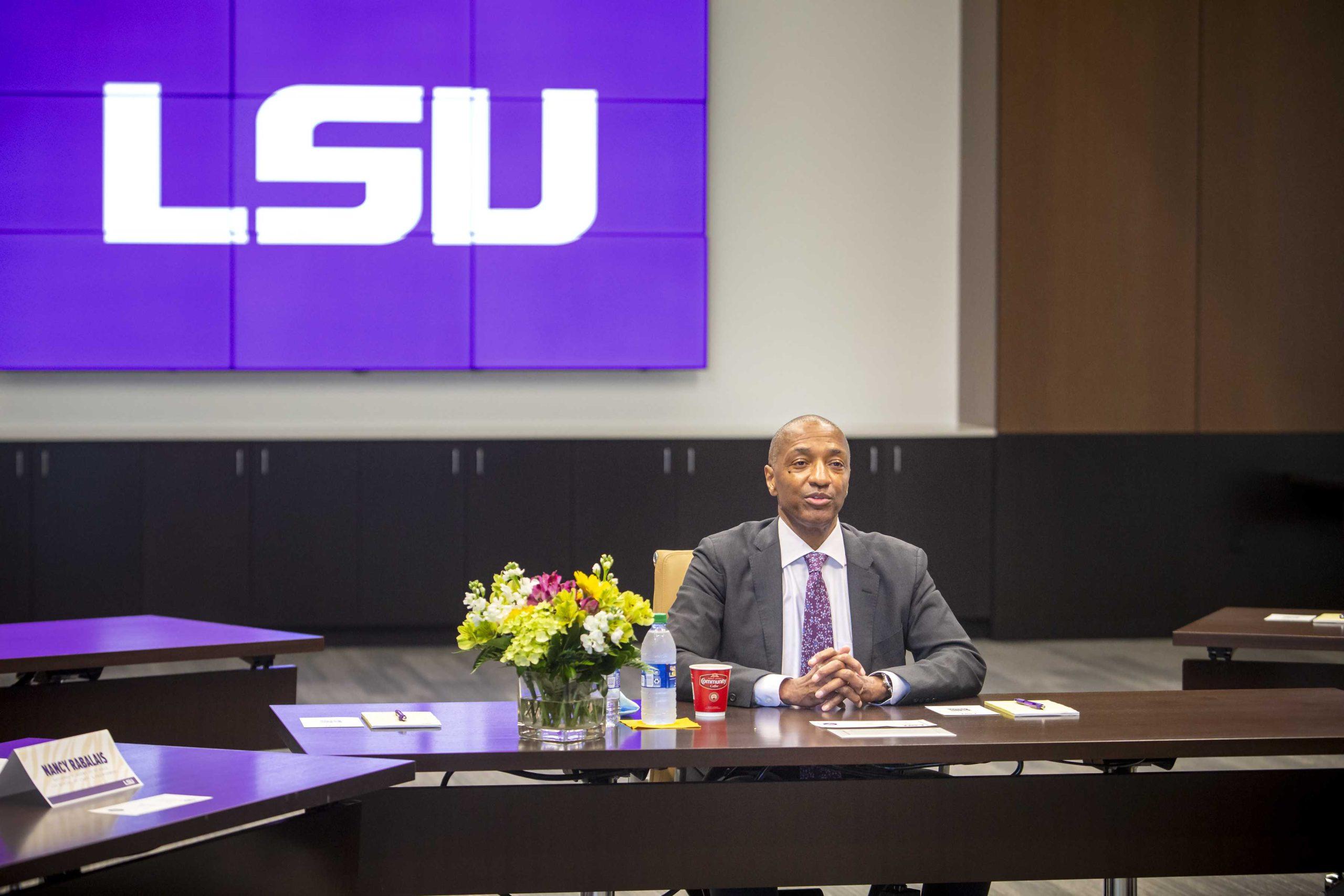At one of the most tumultuous times in modern university history, Interim President Tom Galligan’s tenure has come to an end, a multitude of unsolved problems awaiting his successor.
Galligan’s administration, which began in January 2020, was marked by the pandemic, national and local racial justice movements and a months long Title IX scandal. The search for a permanent president began in November, and the Presidential Search Committee set out to avoid the controversy that surrounded the election of former president F. King Alexander in 2013.
The man ultimately chosen for the job, William F. Tate IV, comes to Baton Rouge at a critical juncture in time as the university reckons with COVID-19 missteps, an ongoing struggle with its racist history and public revelations of years of university mishandling reports of sexual violence.
The LSU Board of Supervisors’ appointment of Tate on May 7 was historic. With his election, Tate will become the first Black president in both university and Southeastern Conference history.
This won’t be Tate’s first time in the conference, having most recently served as the provost and executive vice president for academic affairs at the University of South Carolina, a position he’s held since July of last year. Before South Carolina, Tate spent 18 years as the dean of the graduate school at St. Louis’ Washington University.
Tate’s qualifications are broad and impressive, including a Ph.D. in mathematics education from the University of Maryland and multiple Master’s degrees from the University of Texas at Dallas and the Washington University School of Medicine. Though his educational prowess is clear, his election still sparked controversy because of the abnormal process that preceded it.
Tate wasn’t among the 23 candidates released to the public by the university, but was interviewed as one of three finalists in an eleventh-hour application. During his interview, Tate revealed that he met LSU Board of Supervisors members and learned of the position at the Governor’s Mansion following a football game between LSU and South Carolina.
His absence from earlier candidate lists released by the Presidential Search Committee was reminiscent of the infamous and highly secretive selection process that elevated Galligan’s predecessor, F. King Alexander, to the presidency, raising questions of transparency that the committee was founded in order to avoid.
Other criticisms of his election relate to the university’s continued Title IX scandal that has dominated community discourse over the past few months and garnered national news attention. UofSC, over a similar time period, has had a Title IX scandal of its own. And Tate, much like our own administrators, was criticized by some students for his response.
Three professors at UofSC have been accused of sexual harassment by students, and all three are being paid full salaries following their removal from campus and teaching duties. Female students say the university repeatedly mishandled their sexual harassment allegations and failed to prevent further abuse. Sound familiar?
Tate, the second most powerful man on the UofSC campus, was criticized for the administration’s lackluster response. Students dawned protest signs reading “fire all abusers” and compared the sabbatical pay received by the professors to “paid vacations.”
Our university has never had a president willing to fight fiercely and unequivocally for Title IX. Considering his history at UofSC, Tate may not be that president either. In his application for LSU president, Tate promised he would “hold members of the university community accountable” and focus on “trauma-informed approaches” to Title IX – promises he seems, in the eyes of at least some of his former students, not to have fulfilled at UofSC. As Interim President Galligan said following the release of the Husch Blackwell report, “actions will always speak louder than words.” Only time will tell if Tate’s words hold up better than those of his predecessors.
Tate steps into the presidency in a difficult time for the university. Like most universities around the world, our community has been substantially affected by the pandemic – academically, socially and financially.
The university reportedly lost $27 million in revenue over the past year. The 2020-21 school year budget decreased 1.5% from previous years, though Governor John Bel Edwards recently signed a significant $56 million increase for the 2022 higher education budget.
This increase gives Tate access to resources that Galligan didn’t have at his disposal – resources that will allow him to better tackle the greatest issues our university currently faces.
Racial justice movements of the past year have forced the university to reckon, at least in part, with its deep-rooted history of white supremacy.
Student organizations like Cooperation Rouge, formerly known as Democracy at Work, put pressure on the Galligan administration to rename 12 buildings, including what was formerly known as Middleton Library. Additionally, Galligan created the Diversity and Inclusion Roadmap as his administration began to address inequalities present on our campus.
These new policies that Tate will inherit are aimed to “ensure the Office of Diversity is staffed at levels to sustain existing programming and develop new initiatives/development opportunities.” In addition to this recent diversity plan, Tate will work with the newly appointed Associate Vice provost for Diversity Luz Randolph.
Other campus changes over the last year include new buildings like dorm halls Azalea and Camellia which will replace the decades-old Acadian, McVoy, Kirby Smith and Herget halls: physical representations of a new direction for the university.
Despite these positive changes, the university still grapples with the aftermath of the enormous problems the Galligan administration was defined by.
As Tate awaits his swearing-in, the university finds itself at a crossroads. The past decade of university history has been scarred by exhausting scandals, turnover of leadership and national social and political upheaval. The university desperately needs stability, and Tate has the opportunity to be the figure that finally brings us out of what has been a seemingly endless storm.
The soon-to-be president has many important choices before him that will shape the character of our university for years to come.
Tate must carefully choose how he relates to and works with the Board of Supervisors and the state government. While it is important to foster positive relationships with legislators, he must remain firm and with the well-being of students as his first priority as he advocates for higher education at the state capitol. Our university also desperately needs someone with the backbone to stand up to the reported backroom deals and social sway of Board members.
As Tate takes office, he must prioritize issues that have fallen to the wayside during past administrations.
Campus infrastructure is in desperate need of attention and funding. The university struggles to house its annually record-breaking freshmen class. Buildings like Lockett Hall are notoriously decrepit and dysfunctional. The LSU Library floods while the football team gets a multi-million dollar facility upgrade. It is vital that Tate lobbies for resources to improve and expand on-campus housing and educational spaces, keeping accessibility for all students top of mind.
Tate must act with unapologetic courage in rethinking the Title IX system that has robbed so many on our campus of their well-being, rights and education. He cannot continue the superficial accountability and bare minimum reforms of the Galligan era. Tate should aim to create a Title IX system that is exemplary, not merely compliant with the federal guidelines ignored by the university for decades. He must listen to the stories of students, the advice of advocates and the lessons of past failures.
In addition to tackling sex discrimination, the new president must work for racial and economic justice on campus.
The university continues its disturbing use of prison labor which relies on the unpaid work of predominately Black incarcerated men and was described by an LSU professor as “slavery on campus.” Campus union organizers are fighting to provide every worker at the university with a higher, living minimum wage of $15 an hour. Our university still severely underrepresents Black students, and racist attitudes and systems remain a problem on campus. Tate should work with student organizers and activists to address these, and other, longstanding problems.
Tate – a distinguished professor of epidemiology, among other subjects – must also tackle the pandemic with the authority often absent from the Galligan administration.
In February, the university announced that it expected “we will be able to operate the way we did before the onset of the pandemic,” but with Louisiana vaccination rates at a dismal 34%, student vaccination at only 26% and new virus variants coming to the United States, that claim remains uncertain. Tate should heed the Faculty Senate’s overwhelming passage of a resolution to add the existing COVID-19 vaccines to the required list for students, and must also decide if maintaining the mask mandate in the Fall is appropriate.
He will face these urgent public health choices soon after entering office. His number one priority must be public health, not revenue or public opinion.
So while Tate enters office with an increased budget and some improvements from the Galligan administration, he also inherits a university suffering from issues that cannot be solved with a simple transition of power. This new administration, though a welcome change for many students, must be held with scrutiny to account.
Students cannot settle for the same tune from a different leader. We must demand change in campus systems, attitudes and priorities that are failing students. This change cannot come from a passive student body, but instead demands a loud, educated community. The university cannot live in the past any longer, and we must do everything in our power to ensure that Tate ushers us into the future.
For the first time in over a decade, the University House will be home to an LSU president and his family. May its new resident have the courage, grace and authority to navigate the challenges that lie ahead.
















